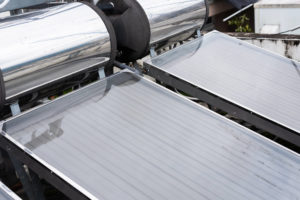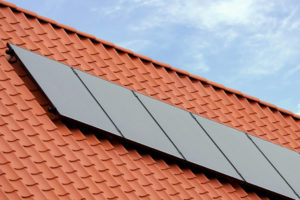Are you one of those people who are tired of paying their sky-high energy bills?
Every time the chilling winters strike, you worry more about your electricity bills than the water heating system. That’s where thermodynamic panels swoop in with renewable energy for all your hot water needs.
Whether you’re concerned about the cost of installation or maintenance, thermodynamic solar panels come through for every need!
It’s time to say bye-bye to costly electricity and hello to hot water all year long!
Contents
- 1 Key Takeaways
- 2 What Are the Thermodynamic Panels?
- 3 How Do Thermodynamic Solar Panels Work?
- 4 How Are Thermodynamic Panels Different from Solar Hot Water Systems?
- 5 What Are the Benefits of Thermodynamic Panels?
- 6 Tips to Take Care of Your Thermodynamic Panels
- 7 Case Study: Implementation and Benefits of Thermodynamic Panels in a UK Household
- 8 Expert Insights From Our Solar Panel Installers About Thermodynamic Panels
- 9 Discover the Power of Solar with Solar Panels Network
- 10 Final Thoughts
Key Takeaways
- Thermodynamic panels are a renewable energy solution for hot water needs that work by utilising air source heat pumps.
- Unlike traditional solar panels, thermodynamic panels can operate efficiently even in ambient air source heat and store heat for later use, reducing the need for constant heating.
- The benefits of thermodynamic panels include reduced electricity bills, exceptional renewable energy generation, increased property value, little maintenance requirements, and a good return on investment, making them a cost-effective and environmentally friendly choice for heating solutions.
What Are the Thermodynamic Panels?
The thermodynamic panels are solar technology-based air source heat pumps. Usually, the most common image that erupts in our minds is a plate with photovoltaic (PV) cells for a solar energy system on the roof. However, thermodynamic solar is diverse from PV panels.
While the conventional systems operate on the heat from the sun, the latest technology utilises air source heat for your hot water cylinder.
Even though they might appear like solar thermal panels, they act as a refrigerator in reverse. The technology depends on the temperature difference between the coolant in the systems and the air around them.
How Do Thermodynamic Solar Panels Work?
The thermodynamic panels garner heat from the atmosphere while placed on the roof. Unlike conventional panels, they are solar-assisted heat pumps.
To be precise, the liquid refrigerant circulates directly through a panel, absorbing heat while vaporising and turning into a gas.
Unlike PV cell-based solar heating systems, the thermodynamic panels don’t need full sunlight. While they can absorb energy from direct sunlight, the heating panel uses ambient air source heat. That’s why they’re more commonly called collector solar thermal panels.
The critical efficiency indicator for solar thermal panel technology is the coefficient of performance (COP). Your device’s COP measures the heat generated for each unit of electricity put into the system. The higher the COP, the better the home air source heat pump.
Mount the thermodynamic panel boiler on your roof or a wall. They’re flexible to adapt and deliver central heating whenever you need it!

How Are Thermodynamic Panels Different from Solar Hot Water Systems?
The main point of difference lies in their sunlight exposure.
The solar hot water can either heat the refrigerant or the water directly on the traditional collector systems. The collectors need direct sunlight to heat the fluid in a hot water cylinder.
On the other hand, solar-assisted thermodynamic panels are more efficient because they can store heat by pressuring and concentrating. So, now your water heating system doesn’t need to run all day to heat water. Instead, it can use the preserved warmth.
Technologically, the difference occurs because of the compressor acting as a thermal exchange controller.
Note: Although the panel system is efficient for your heating needs, you can get the best of them in direct sunlight during freezing weather.
What Are the Benefits of Thermodynamic Panels?
The thermodynamic panels form one of the most exciting technologies among clean energy enthusiasts. Whether you want hot water or central heating, with little maintenance and low costs, they can provide heat all day.
But that’s just not it!
Reduced Electricity Bills
With a thermodynamic panel installed, you can ditch the expensive heat pump and installers when operating on fluid to turn into gas.
Depending upon the size of the heat pump, type of the heater, and the area to be heated, you can save a considerable amount of money.
The thermodynamic panels boast low cost and high efficiency for getting free hot water all season long. You can get your constant hot water supply with a drop in your electricity bills by 50%–80%.
Exceptional Renewable Energy Source
Free, Cost-Effective, and Sustainable – These are the markers of solar panel energy.
Clean harvesting becomes a cakewalk with the sun as the powerhouse of your energy needs. On top of it, no more carbon emissions or carbon footprint woes for you.
You might have been using gas or electricity for your hot water needs. But now, you can save all the excuses and money in one go.
Doesn’t it feel good to be of use to the environment?
Property’s Invaluable Asset!
Whether installed for hot water temperature or a central heating system, it reflects well for your property. From domestic to commercial use, the thermodynamic panels enhance the property value because of their long-term efficiency.
So, if you want to set off a mortgage for 20 years, it’s best to look for houses with solar heating systems installed. Instead of a price cut, you’ll get more quotes than you can anticipate.
Little Maintenance Requirements!
With more and more upgrades in solar technology, you get the best variety and low maintenance. Most warranties with the thermodynamic panels cover longer durations and, therefore, hassle-free heating for the owners.
Effectively, with many reduced panel costs in the market and added warranty support, you may call it a free energy generator.
Get used to the new installers for free heating of your home!
Note: You may dust the thermodynamic panels as part of your regular cleaning routine for optimum performance.

Good Return on Investment
You can save money and earn by selling the excess energy to the grid.
Even though the thermodynamic panels cost a reasonable amount initially, you save money on the bills. At the same time, you could get rewarded through government grants.
All you need to do is find a scheme in your homeland to grant you a perfect return on investment.
Could gas ever get you and your country closer to greener solutions?
Tips to Take Care of Your Thermodynamic Panels
Even though solar thermal panels make for one of the most cost-effective and hassle-free systems, you still need precautions for handling them!
Don’t Touch When The Panel is On
You must deal with the solar heating system carefully, especially when turned on. It’s evident for rational people not to get close to any heat or electricity-generating equipment. However, you must be extra cautious while cleaning or disinfecting your system.
Don’t Tamper with the System
Turning and operating your panels is relatively easy. Even when you doubt, the manual guide is straightforward to consult and get guidance from.
If any faults arise, you can consult a specialist to remove your panel woes.
Take Measures During Extreme Weather
You can never know when the storm will hit your area. However, it would be best to take precautions when there’s any hailstorm or extreme weather activity in your region.
The best caution you can exercise in the unlikely turn of events is disconnecting your domestic solar thermal system.
Case Study: Implementation and Benefits of Thermodynamic Panels in a UK Household
Background
A family in the UK sought a more efficient and cost-effective solution for their hot water needs, especially during winter when energy consumption and costs typically spike. They decided to install thermodynamic panels as part of a broader effort to reduce their environmental impact and energy expenses.
Implementation
- Assessment and Planning: The installation team conducted a thorough assessment of the property, focusing on roof space, orientation, and potential shading. They determined that the property was well-suited for a thermodynamic panel system.
- Installation Process: The system, consisting of a thermodynamic panel array and a heat exchange unit, was installed on the roof. The panels were positioned to maximize exposure to ambient air and sunlight. The installation also included an energy-efficient hot water cylinder.
- System Setup and Testing: After installation, the system was calibrated to ensure optimal performance. The setup was designed to provide hot water continuously, even on cloudy days or at night, by leveraging the ambient air temperature.
Results
- Energy Production and Savings: The system produced sufficient hot water for the household’s needs, significantly reducing reliance on traditional heating methods. The family reported a 60% reduction in energy bills for water heating, translating to annual savings of approximately £500.
- Environmental Impact: By switching to thermodynamic panels, the household reduced its carbon footprint by an estimated 1.2 tonnes of CO2 annually.
- Additional Benefits: The system required minimal maintenance, and the family appreciated the consistent hot water supply without the need for constant heating.
Summary
The installation of thermodynamic panels provided the family with a reliable, efficient, and environmentally friendly hot water solution. The significant cost savings and reduced carbon footprint underscored the benefits of investing in this renewable energy technology. The case study highlights the practicality and effectiveness of thermodynamic panels for residential use in the UK.
Expert Insights From Our Solar Panel Installers About Thermodynamic Panels
Thermodynamic panels are revolutionary in the renewable energy sector. Unlike traditional solar panels, they can operate efficiently in various weather conditions, including cloudy days and at night, making them an excellent choice for year-round energy needs.
Chief Renewable Energy Engineer
One of the most significant benefits of thermodynamic panels is their ability to use ambient air source heat, not just direct sunlight, to generate hot water. This versatility ensures a consistent hot water supply, even in less sunny climates.
Solar Thermal Systems Specialist
Thermodynamic systems are relatively easy to maintain and offer significant energy savings over time. They are particularly beneficial for homeowners looking to reduce their carbon footprint and save on utility bills.
Energy Efficiency Consultant
Discover the Power of Solar with Solar Panels Network
Are you navigating the world of solar installations? Look no further than Solar Panels Network, the UK’s trusted partner in harnessing the sun’s potential. Our dedication goes beyond just installations; we’re on a mission to transform how homeowners and businesses across the UK perceive and utilise energy. By choosing us, you’re reducing your carbon footprint and making a smart financial move that promises savings for years ahead. Contact us today and embark on your solar journey.
Final Thoughts
Thermodynamic solar panels are becoming the favourite source of renewable power for users with high efficiency.
Solar thermal panels can compress them all whether you want a domestic system or a commercial panel for your heating needs. On top of it, your home’s electricity consumption also drops.
About the Author
Solar Panels Network stands at the forefront of solar energy solutions, driven by a team of seasoned solar engineers and energy consultants. With over decades of experience in delivering high-quality solar installations and maintenance, we are committed to promoting sustainable energy through customer-centric, tailored solutions. Our articles reflect this commitment, crafted collaboratively by experts to provide accurate, up-to-date insights into solar technology, ensuring our readers are well-informed and empowered in their solar energy decisions.

